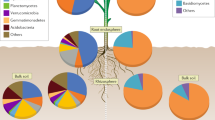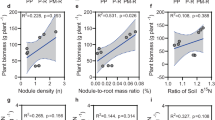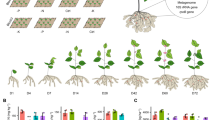Abstract
NITROGEN deficiency has been known to bring about certain specific changes in growth, physiology and composition of sugar-cane plants1,2. Its effect on mineral composition is less clearly understood. To throw light on this problem, sugar-cane variety Co 453 was grown in (1) Hoagland's complete nutrient culture, and (2) Hoagland's nitrogen-deficient culture for the entire life-cycle3. Percentages of nitrogen, P2O5, K2O, calcium, magnesium and sulphur in sugar-cane leaf and stem were estimated at maturity according to standard methods of analysis and expressed as percentages of dry weight.
This is a preview of subscription content, access via your institution
Access options
Subscribe to this journal
Receive 51 print issues and online access
$199.00 per year
only $3.90 per issue
Buy this article
- Purchase on Springer Link
- Instant access to full article PDF
Prices may be subject to local taxes which are calculated during checkout
Similar content being viewed by others
References
Clements, H. F., et al., Hawaiian Planter's Rec., 25, 227 (1941).
Singh, B. N., et al., Progress Report of Researches on Physiology of Wheat and Sugar-cane, I.C.A.R., India (1940–42).
Lal, K. N., and Mehrotra, O. N. (unpublished data).
Thomas, W., Plant. Physiol., 12, 571 (1937).
Author information
Authors and Affiliations
Rights and permissions
About this article
Cite this article
LAL, K., DE, R. Elemental Composition of Sugar-cane Leaf and Stem in relation to Nitrogen Deficiency. Nature 167, 731–732 (1951). https://doi.org/10.1038/167731a0
Issue Date:
DOI: https://doi.org/10.1038/167731a0
Comments
By submitting a comment you agree to abide by our Terms and Community Guidelines. If you find something abusive or that does not comply with our terms or guidelines please flag it as inappropriate.



